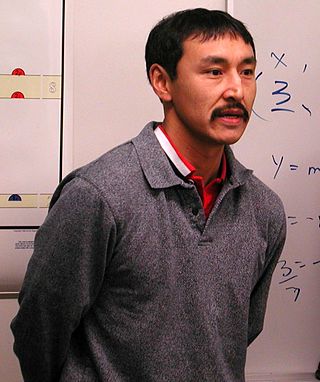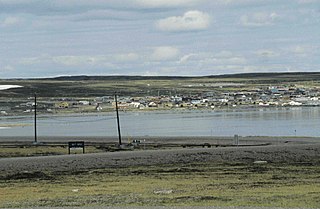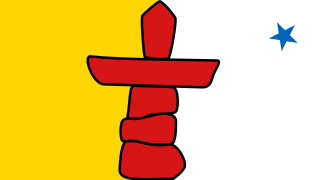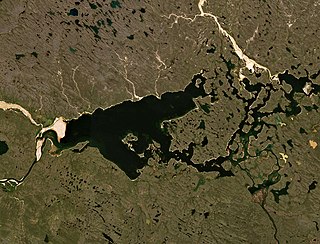Related Research Articles

Paul Okalik is a Canadian politician. He is the first Inuk to have been called to the Nunavut Bar. He was also the first premier of Nunavut.

Rankin Inlet is an Inuit hamlet on the Kudlulik Peninsula in Nunavut,Canada. It is the largest hamlet and second-largest settlement in Nunavut,after the territorial capital,Iqaluit. On the northwestern Hudson Bay,between Chesterfield Inlet and Arviat,it is the regional centre for the Kivalliq Region.

The Kivalliq Region is an administrative region of Nunavut,Canada. It consists of the portion of the mainland to the west of Hudson Bay together with Southampton Island and Coats Island. The regional centre is Rankin Inlet. The population was 11,045 in the 2021 Canadian census,an increase of 6.1% from the 2016 Census.

Kitikmeot Region is an administrative region of Nunavut,Canada. It consists of the southern and eastern parts of Victoria Island with the adjacent part of the mainland as far as the Boothia Peninsula,together with King William Island and the southern portion of Prince of Wales Island. The regional centre is Cambridge Bay.
Piita Taqtu Irniq,formerly Peter Irniq,is an Inuk politician in Canada,who served as the second commissioner of Nunavut from April 2000 to April 2005.

Baker Lake is a hamlet in the Kivalliq Region,in Nunavut on mainland Canada. Located 320 km (200 mi) inland from Hudson Bay,it is near the nation's geographical centre,and is notable for being Nunavut's sole inland community. The hamlet is located at the mouth of the Thelon River on the shore of Baker Lake. The community was given its English name in 1761 from Captain William Christopher who named it after Sir William Baker,the 11th Governor of the Hudson's Bay Company.

Nunavut Arctic College is a public community college in the territory of Nunavut,Canada. The college has several campuses throughout the territory and operates as a public agency funded by the territorial government.
Nunavut Tunngavik Incorporated is the legal representative of the Inuit of Nunavut for the purposes of native treaty rights and treaty negotiation. The presidents of NTI,Makivik Corporation,Nunatsiavut,and the Inuvialuit Regional Corporation,the four regional land claims organizations,govern the national body,the Inuit Tapiriit Kanatami (ITK) as its board of directors. NTI continues to play a central role in Nunavut,even after the creation of the Government of Nunavut. As the successor of the Tunngavik Federation of Nunavut,which was a signatory of the Nunavut Land Claims Agreement on behalf of Inuit,NTI is responsible for ensuring that the Nunavut Land Claims Agreement is implemented fully by the Government of Canada and the Government of Nunavut and that all parties fulfill their obligations.

Whale Cove,is a hamlet located 74 km (46 mi) south southwest of Rankin Inlet,145 km (90 mi) northeast of Arviat,in the Kivalliq Region,Nunavut,Canada,on the western shore of Hudson Bay.
Alan Keith Peterson was born in Whitehorse,Yukon,Canada and lives in Cambridge Bay,Nunavut. He was the [Member of the Nunavut MLA] for the electoral district of Cambridge Bay having won the seat in the 2004 Nunavut general election. He was re-elected in the 2008 and 2013 elections.

Ennadai Lake is a lake in the Kivalliq Region,Nunavut,Canada. It is 84 km (52 mi) long,and 4.8 to 22.5 km wide. It is drained to the north by the Kazan River. A 615 km (382 mi) section of the Kazan River from the outlet of Ennadai Lake to Baker Lake,was designated as a part of the Canadian Heritage Rivers System in 1990.

Nunavut is the largest,easternmost,and northernmost territory of Canada. It was separated officially from the Northwest Territories on April 1,1999,via the Nunavut Act and the Nunavut Land Claims Agreement Act,which provided this territory to the Inuit for self-government. The boundaries had been drawn in 1993. The creation of Nunavut resulted in the first major change to Canada's political map in half a century since the province of Newfoundland was admitted in 1949.

Kivallirmiut,also called the Caribou Inuit,barren-ground caribou hunters,are Inuit who live west of Hudson Bay in Kivalliq Region,Nunavut,between 61°and 65°N and 90°and 102°W in Northern Canada.

Beverly Lake is a lake in the Kivalliq Region,Nunavut,Canada. It is located north of the Arctic tree line about 150 km (93 mi) northwest of Baker Lake,Nunavut. The western half of the lake is within Thelon Wildlife Sanctuary. The Thelon River,at the confluence with the Dubawnt River,empties into the lake's southwestern bank. The Kazan River empties into the Thelon River at Beverly Lake's southeastern bank,between Beverly and Aberdeen Lakes. A delta occurs on the Beverly Lake's southern edge,which includes the Isarurjuaq Peninsula.

Garry Lake is a lake in sub-Arctic Kivalliq Region,Nunavut,Canada. As a portion of the Back River waterway,Garry Lake originates directly east of Lake Pelly and drains to the east by the Back River. A set of rapids separate Buliard Lake from Garry Lake. Two other sets of rapids separate Garry Lake's three sections which are also differentiated by elevation. Garry Lakes are isolated from nearby communities.
Adamee Komoartok is a Canadian politician,who was elected as the Member of the Legislative Assembly for the electoral district of Pangnirtung in the Legislative Assembly of Nunavut in the 2008 territorial election.
Enuk Pauloosie is an Inuk Canadian,a former politician who was elected as the Member of the Legislative Assembly for the electoral district of Nattilik in the Legislative Assembly of Nunavut in the 2008 territorial election. His,now defunct,riding of Nattilik encompassed the communities of Gjoa Haven and Taloyoak,Nunavut.
Inuit Sign Language is one of the Inuit languages and the indigenous sign language of the Inuit people. It is a language isolate native to Inuit communities in the Canadian Arctic. It is currently only attested within certain communities in Nunavut,particularly Baker Lake and Rankin Inlet. Although there is a possibility that it may be used in other places where Inuit live in the Arctic,this has not been confirmed.

Cannabis in Nunavut,as in the rest of Canada,became legal for recreational use on the effective date of the Cannabis Act on 17 October 2018.
References
- ↑ "2008 General Election results for Baker Lake". Elections Nunavut. Retrieved October 26, 2010.
- 1 2 "Nunavut MLA charged with liquor possession". CBC News. October 26, 2010.